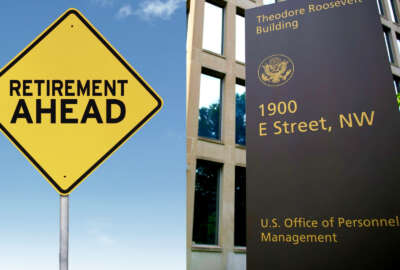OPM launches personal coaching network for feds
The government is betting that personal coaches can help boost federal employees\' sagging morale and even make agencies more productive. The Office of Personnel...
The government is betting that personal coaches can help boost federal employees’ sagging morale and even make agencies more productive.
The Office of Personnel Management has compiled a governmentwide database of certified coaches — all federal employees who have other day jobs — who can be deployed to help any federal employee at any agency. It’s now embarking on a marketing push to let agencies know about the database. OPM says there are only 110 registered coaches now, but it has plans to train 60 more within the next few weeks. Deputy Associate Director Steve Shih, who oversees performance-management issues, says he hopes the number will grow exponentially in the next few years.

Listen to OPM associate deputy director Steve Shih discuss the new governmentwide coaching network.
“Our ultimate goal is a coaching culture across the government, empowering leaders at all levels to practice the types of skills and approaches we believe are vital to learning and success,” he said. “These would be: self-reflection, creativity and problem solving, accountability, and candid and respectful communication.”
Last year’s Federal Employee Viewpoint Survey, administered by OPM, underscored federal employees’ increasing glum views of their work lives. Obama administration officials have bemoaned the decline in employee engagement ever since, urging agencies to hold their senior leaders accountable for their employees’ satisfaction.
Given the context, the coaching program is a strategic priority, Shih said.
“In an era where we’re dealing with budget constraints and lots of new and sometimes overwhelming mission requirements, it’s often times difficult to focus on things that really can help our organizations grow more successfully,” he said. “We’re constantly fighting fires. Sometimes it’s difficult to step back and figure out a different way to fight fires.”
Federal coaches: Less like sports; more like Cinderella’s ride
OPM partnered with the Chief Learning Officers’ Council to develop the database after OPM officials observed a three-year-old coaching program at the department of Health and Human Services. Volunteers from all of the department’s disciplines — from medicine to human resources to budgeting — have gone through training at one of several certificate programs.

Listen to Alan Myers, manager of leadership and organization development programs at the department of Health and Human Services, discuss HHS’ coaching program.
Alan Myers, the department’s manager of leadership and organizational development programs, said HHS’ personal coaches work one-on-one with their clients. Rather than give directions, the coaches ask probing questions aimed at getting people to formulate their own solutions, he said.
“We’re not telling them to turn right or turn left. They have the reins. We’re along for the journey with them,” he said.
“We assume you don’t need to be fixed. We assume you may be stuck in trying to reach your goals and we’re going to help you get unstuck,” he added.
Coaching improves employees’ productivity as well as their engagement with work, he said. HHS is testing that theory on two dozen of its Senior Executive Service members in a pilot program. The department will measure the impact of coaching by collecting data at “pulse checks” with the participants, their work units and their coaches.
The pair are asking themselves, “What can they do differently to begin to change the culture of the organization?” Myers said. If successful, they will share their findings with the rest of the government.
Coaching’s success depends on making the right match between coach and client, Myers said. The governmentwide database should help in that regard, by letting designated managers sift through accounts to find coaches with suitable training, interests and availability, he said.
RELATED STORIES:
2014 Federal Employee Viewpoint Survey: Senior leaders get low marks
White House to hold federal managers accountable for employee engagement
Copyright © 2025 Federal News Network. All rights reserved. This website is not intended for users located within the European Economic Area.





